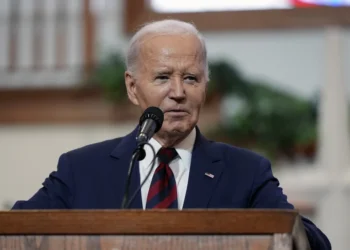The Democrat Party is grappling with a significant loss of male voter support that likely cost them the 2024 election. In a moment of clarity, Democrat strategist Joe Caiazzo lamented, “Everything we’ve done up to this point has resulted in reelecting Donald Trump.”
Bingo.
According to data from the progressive firm Catalist, Trump won 54% of male voters overall and 52% of men under 45, a significant gain from previous elections. Specifically, Democrat support among white college-educated men dropped from 2020, with Democrats securing only 51% of this group compared to 54% for Joe Biden. Among white non-college-educated men, Kamala Harris lost three points compared to Biden’s 2020 performance, while female support in this demographic remained steady. These figures highlight a gendered divergence: while women’s support for Democrats remained steady, men, particularly young and working-class men, shifted toward the Republican Party.
This shift wasn’t limited to white voters. Trump made historic inroads with minority men, capturing roughly one-third of nonwhite male voters without a college degree, up from one-fourth in 2020. Among Hispanic-majority counties, 66 out of 67 swung toward the GOP by an average of 23 percentage points compared to 2012, underscoring Trump’s appeal to working-class men across racial lines. The data paint a clear picture: Democrats lost ground with men, particularly those less engaged with politics, a pivotal group that secured Trump’s Electoral College battleground sweep and popular vote victory.
To anyone else, it’s not shocking that the Left’s hostility toward men in recent years has driven men away from the party. Democrats blame men for society’s problems, even enlisting Barack Obama to suggest that men who didn’t vote for Kamala Harris were driven by internalized misogyny rather than independent thought or personal priorities. But to the Democrats — who might not be able to define “man” — this phenomenon is baffling.
As such, the Democrat response, as outlined in a New York Times report, is a $20 million project to study how men vote and attempt to create their own version of influential figures like Jordan Peterson and Joe Rogan within the party.
The initiative, dubbed “Speaking with American Men” (SAM), is an effort to dissect the branding, language, and content that resonate in male-dominated online spaces, such as video games, with the hope of reconnecting with young male voters who shifted toward Donald Trump last November. However, the SAM initiative has been met with skepticism from both sides of the aisle.
“Democratic donors treating men like an endangered species on a remote island they need to study probably won’t rebuild trust. This kind of top-down, anthropological approach misses the point: people don’t want to be decoded, they want to be understood and met where they are,” MSNBC contributor Rotimi Adeoy posted on X. “The idea that you can ‘fix’ the male voter problem that exists with Black, Latino, and white men by spending $20 million to study their syntax like they’re a foreign culture is exactly why there’s a disconnect. These voters aren’t a research subject. They’re citizens.”
To add to the heavy skepticism of this agenda, Democrats’ recruitment of activist Olivia Julianna as an “expert” on male voting priorities raises even more doubts about its effectiveness in addressing the root causes of Democrats’ disconnect with men. Julianna, who describes herself as someone who “loves frat guys” and spending time with young men on college campuses, asserts that many are “almost always pro-choice, pro-gay marriage” and supportive of Black Lives Matter. The real problem, in her view, is simply that young men feel unwelcome by the Left.
The SAM initiative and Julianna’s role highlight a fundamental flaw in the Democrat strategy: a reliance on performative tactics and external expertise rather than genuine engagement with the priorities of male voters. Obama’s “finger-wagging” accusations of sexism, Harris’s dismissal of Christian men at a rally, and Tim Walz’s awkward hunting trip — coupled with ads encouraging women to hide their votes from their husbands, framing men as untrustworthy or irrelevant — reinforce the idea that Democrats have little interest in authentically connecting with men, and that they believe stereotypes and pandering are the way to go.
The current initiative falls into the same trap.
New York Times columnist David French — the paper’s token “conservative” who voted for Harris out of Trump derangement — argues that the $20 million plan misses the mark by focusing on strategy over sincerity. He suggests Democrats need to “embrace men with sincere affection” rather than treating them as a puzzle to be solved through data analytics or viral content. This sentiment is echoed by conservative commentators like Athena Raymond, who argue that the party’s decades-long rhetoric — labeling men as “toxic” or “trash” — has built a platform that inherently repels male voters. By framing issues like abortion as the sole lens through which men should view politics, Democrats have ignored concerns like economic stability, job opportunities, and infrastructure, which resonate deeply with working-class men.
Moreover, the SAM project’s proposed solutions, such as expanded child tax credits and workforce training, are recycled from — wait for it! — the 2024 platform that failed to inspire male voters. These policies, while valuable, don’t address the cultural and emotional disconnect men feel from a party perceived as dismissive of their contributions. As Raymond notes, “You’ve spent the last two decades building a platform on not needing them, on thinking they’re worthless.” Addressing the problem with this narrative, she states, “Men are a lot of our infrastructure, our agriculture, labor, unions, military. You would not be okay without men.” This rhetoric, combined with a failure to apologize for or rectify past alienation, undermines the $20 million investment.
For Democrats to regain the support of male voters, they must move beyond superficial fixes and address the deeper cultural rift. The party’s focus on fear-based messaging — warning of lost rights over abortion or social justice issues — may resonate with women, but fails to engage men who prioritize real-world results over emotional appeals. Policies addressing economic opportunity, infrastructure, and labor — areas where men are heavily represented — could bridge this gap, but only if paired with a genuine shift in tone.
The involvement of figures like Olivia Julianna, whose rhetoric often mirrors the divisive language men associate with the Left, risks further entrenching this divide. Spending $20 million to study “male syntax” signals a party out of touch with half the population, banking on manipulation rather than mutual respect. Without addressing the underlying issues of alienation and disdain, Democrats are likely to solidify a generational loss of male voters, leaving their coalition fractured as they head into future elections.

















